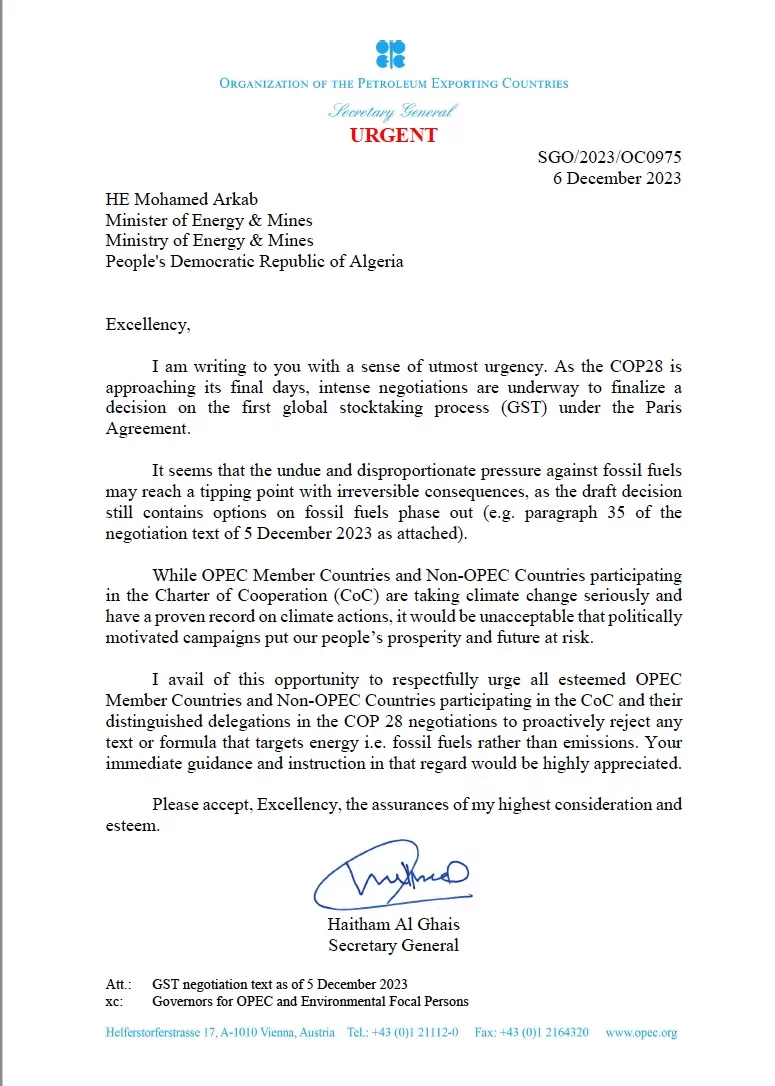In my last post, here, I raised what I considered a singularly-critical question arising from the recently-concluded COP28:
Why did the recently-concluded 28th Conference of the Parties to the UNFCCC abjectly fail to agree to a global phase out of fossil fuels?
Admittedly, a strong commitment by the nations would have been a heavy lift. After all, the Powering Past Coal Alliance of nations – led, at first, by a coalition of South Pacific Island and European states, but quickly joined by Costa Rica, El Salvador, Mexico, and Angola – had secured only 50 signatories over six years of work. And yet, by the middle of the conference, an additional 10 signatories were secured, including the United States. Led by President Biden’s Special Climate Envoy John Kerry, the US announced its change in position on Day 3 of COP28.
Buoyed by that piece of limited good news, I was eager and pleased to corner a US delegate the very next evening in an informal setting. I’d long anticipated, of course, that a key issue – and perhaps the key contentious issue – would be whether the nations, at long last, would act to secure the commitment of every nation to phase out all fossil fuels, and within a specified time frame, taking account of the long-standing principle of common but differentiated responsibilities.
Indeed, as I indicated in a COP28 program, Dangerous Interference – Fossil Fuel Production, actions to suppress demand will not cut it; we also must phase out supply, that is, the production and exportation of oil, gas and coal.
What is the United States’ position, here at COP28, with respect not only to the needed phase out of coal, but also the phase out of oil and natural gas?
I asked my interlocutor this: What is the United States’ position, here at COP28, with respect not only to the needed phase out of coal, but also the phase out of oil and natural gas?
I’d really thought that question was fair, since the President of Colombia had just that day exercised dramatic leadership by joining an alliance of nine other nations calling for a mandatory Fossil Fuel Nonproliferation Treaty. But we went round and round, until he said, “well, you know Dan, the US delegation is among the most progressive of fossil fuel-producing nations.” He then laughed, a bit nervously. And I felt a bit ill.
But by the middle of COP28, it appeared from various new accounts that Special Envoy Kerry was pressing hard for at least one or other variant of a proposed fossil fuel phase out in the negotiating text, as well as for strong language seeking a rapid phase down of methane (natural gas). If only this advocacy were matched by strong action at home to phase out oil, gas, and coal within reach of US law, as we have argued repeatedly can be done.
But back to Dubai, it appeared that particularly blunt advocacy for the status quo – in particular, retention of the right to continue to produce without limit – was coming from OPEC, the Organization of Petroleum Exporting Countries, and its key allies. See, for instance, the OPEC letter of Dec. 6, 2023, which we reprint at the end of this blog. It “respectfully urged all esteemed OPEC Member Countries and Non-OPEC Countries participating in the CoC (Charter of Cooperation) . . . to proactively reject any text or formula that targets energy i.e. fossil fuels rather than emissions.”
Dedication, above all, to “a stable market [and] the mutual interest of producing nations [to] a fair return on invested capital.”
OPEC, founded in 1960, includes 13 member nations, with nine of them retaining at least one percent of the world’s proven oil reserves: Venezuela (with 24%), Saudi Arabia (22%), Iran (17%), Iraq (12%), United Arab Emirates (9%), Kuwait (8%), Libya (4%), Nigeria (3%), Algeria (1%).
In 2016 and 2019, a Declaration and then a Charter of Cooperation with ten aligned non-OPEC producing nations, respectively, were reached, in order to “re-balance the market, bring down inventory levels[,] support oil market stability,” and affirm “the continued commitment to the mutual interest of producing nations . . . and a fair return on invested capital. . . .” The aligned non-OPEC “producing countries” include Russia (with 13% of world crude production), along with nine smaller producers – Mexico, Kazakstan, Oman, Azerbajian, Malaysia, Bahrain, South Sudan, Brunei, and Sudan.
The Guardian cited some reaction to the OPEC+ intervention by select civil society advocates. One of them, Mohamed Adow, of the NGO and thinktank Power Shift Africa, found that OPEC+ lobbying to continue business as usual to be “shameful.” He observed, pointedly, that “[c]limate change is killing poor people around the globe and these petrostates don’t want COP28 to phase out fossil fuels because it will hurt their short-term profits.”
Another advocate characterized the OPEC+ action as “a desperate attempt to halt the global momentum towards phasing out fossil fuels. The world is no longer swayed by tactics of denial and misinformation. The voices demanding climate justice are growing increasingly more resounding, leaving no room for the fossil fuel industry to employ its underhand[ed] tactics to delay action.” Id.
At COP28 there was plenty of room for the fossil fuel industry to employ its tactics to delay meaningful action, and it worked. Alas.
Mr. Adow was clearly correct, but the above-cited second activist viewpoint proved far too optimistic, alas. In particular, at least at COP28, there was plenty of room for OPEC+ and, more generally, the fossil fuel industry, to employ tactics – whether “underhanded” or not – to delay action. And, I think, they largely worked. At least, for now.
How so? I’ve already mentioned that the Global Stocktake entirely failed to call for a phase out of fossil fuels, notwithstanding some press and others’ mischaracterizations of the point. In addition, that final communiqué failed even to call for the phase out of coal (talk about low-hanging fruit!). Instead, it sought to accelerate efforts “towards the phase-down of unabated coal power.” And, of course, that weasel-word “unabated” was nowhere defined.
The final COP28 statement also urged the nations to scale up “abatement and removal technologies such as carbon capture and utilization and storage.” The promise of CCUS is a cornerstone of the argument – by OPEC+ and other producers – that national and international restrictions should focus on emissions rather than on fossil fuels. But many experts regard that seductive position as an unworthy gambit. For instance, Fatih Birol, head of the International Energy Agency, deemed the prospect of CCUS compensating for a failure of the oil and gas industry to decarbonize “a fantasy, an illusion,” in a recent comment to the Guardian.
Whether certain technologies, still in their infancy, including CCUS and carbon removal, amount to mere gambits to allow petrostates and the rest of the fossil fuel industry to continue their business as usual is a topic to which we may have occasion soon to return.
OPEC Letter of December 6, 2023 Below



